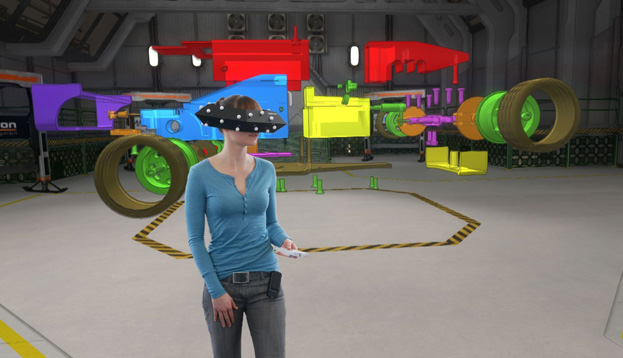Virtual reality continues to pick up speed heading into 2015, between Sony’s Project Morpheus, Oculus’ VR Rift technology, and various other competitors looking to introduce their devices over the next few months. However, some believe that the introduction of such technology will soon blur the lines between virtual and reality further than some may think.
Google’s Noah Falstein, speaking with GamesIndustry International, feels that virtual reality could introduce a new medium that makes the experience more realistic than ever before. “At Google, we’ve done Cardboard and showed that for $20 you can take a high resolution phone and turn it into a simple VR headset,” he said. “I do believe that some forms of virtual reality or augmented reality – or a term I’m pushing, transmogrified reality, that you’re actually blending virtual and real worlds in indistinguishable ways – is bound to become an important subset of games. The technology is reaching a point of maturity that I think it’s inevitable that it will become important.
“What really pushed me over the edge was not the big headsets like Oculus Rift, but rather the shock I had the first time I tried Google Cardboard and I’m not saying this as a Google booster – I was a skeptic, I thought, ‘Sure, it’s a nice diversion to put your phone in and have it give a 3D image,’ but it’s actually quite startlingly good.
“I’m not saying it’s as good as the quality you get in a custom built head mounted display unit but when it’s $20 plus the phone you already have, the barrier to entry is going to be so low for people…a lot of people are going to be introduced to the idea of 3D virtual worlds just through that,” he explained.
As far as the effects of such technology go, Falstein added, “There’s a lot of technology that senses the world around you – we’ve got something called Project Tango which I’ve been very involved with that is a tablet that has 3D depth sensors built into it as well as ultra high quality accelerometers and gyroscopes so that it can map the environment you’re in. And for gaming possibilities it’s amazing. We’re going to be able to integrate the real world around us into the virtual world and in a few years in fact we may be able to mix those so seamlessly that it will be hard to tell the difference between what’s real and what’s virtual around you.”
As far as Google’s approach to the subject, Falstein stopped just short of confirming, but did admit he’s working on a number of things. “It kind of suggests that there’s an integrated games vertical here at Google and the reality is that games are spread throughout the company and there’s a thriving community of game developers within Google in many different parts of the world and working on many different things,” he said. “I get to work on all these cutting edge technologies. Granted, I’m not doing massive games, but it’s fun to do simple games and then share them freely with the world, even share the source code, and let developers learn how to make bigger and better games that way.”
The full interview with Falstein can be found here.

